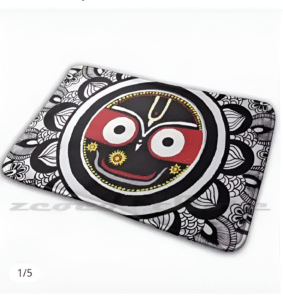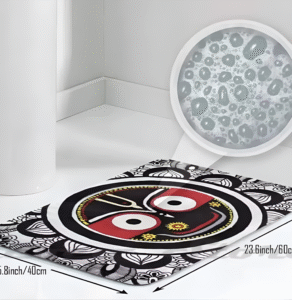
A leading Chinese e-commerce platform has come under intense scrutiny and criticism after a product listing featuring a doormat printed with the sacred image of Lord Jagannath sparked widespread outrage across India and among Hindu communities worldwide. Following massive online protests and diplomatic pressure, the controversial item was swiftly removed from the platform.
The product in question—a floor mat bearing the image of Lord Jagannath, a highly revered deity in Hinduism and a central figure in Odisha’s cultural and religious identity—was listed by a third-party seller on a popular Chinese online marketplace. Screenshots of the listing went viral on social media, drawing immediate condemnation from users who saw the depiction as deeply disrespectful and offensive to their religious sentiments.
Lord Jagannath, worshipped as a form of Lord Vishnu, is one of the most venerated deities in Hindu tradition. The annual Rath Yatra festival of Lord Jagannath in Puri, Odisha, draws millions of devotees from across the globe. As such, the use of his image on a product meant to be placed on the floor—specifically a doormat—was perceived as an act of desecration.
Social Media Storm and Public Outcry, Boycott Chinese Products and Respect Jagannath

The backlash was swift and intense. Hashtags like #BoycottChineseProducts and #Respect Lord Jagannath trended on Twitter and other platforms, with users demanding not only the removal of the offensive item but also an apology from the company. Prominent public figures, religious leaders, and politicians joined the chorus of condemnation, urging the Indian government to take diplomatic action.
Several users also flagged the listing to the Indian Ministry of External Affairs (MEA), calling for intervention against what they described as a deliberate insult to Hindu beliefs. Activist groups in Odisha and other states threatened protests and legal action if appropriate measures were not taken.
Quick Removal After Diplomatic and Cultural Pressure
In response to the escalating outrage, the e-commerce platform issued a statement asserting that the listing had been uploaded by an independent third-party seller and was not reflective of the company’s values. The item was promptly taken down, and the seller’s account reportedly suspended pending further review.

“We deeply regret the listing of a product that has caused offence to our valued users and the Indian community. We have taken immediate action to remove the item and ensure such incidents are not repeated,” the platform stated.
Though no official apology was issued by the Chinese company, the swift action was seen by many as a result of growing global sensitivity toward religious and cultural symbols—especially when misused for commercial purposes.
This incident has reignited conversations about the responsibilities of global e-commerce platforms in vetting products sold by third-party vendors. With the rise of cross-border digital commerce, companies are increasingly being held accountable for content that offends local or religious sensibilities.
Religious leaders and community organizations have stressed the need for stricter international regulations to prevent such occurrences. Many have also urged Indian consumers to remain vigilant and report culturally insensitive items on global marketplaces.
While the removal of the Lord Jagannath doormat listing has brought temporary closure to the controversy, it serves as a stark reminder of the cultural minefield that global businesses must navigate. Respecting religious sentiments is not just good ethics—it’s becoming a necessary part of global brand survival.
As devotees continue to express their pain over the incident, many hope that it will lead to greater awareness and sensitivity in product design and approval, especially where sacred symbols and traditions are concerned.
